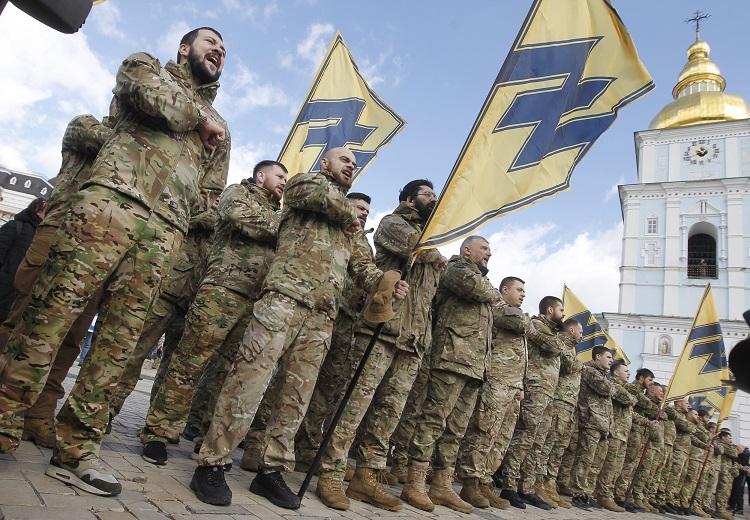
Russia seems to have completely given up on its ambitions to “denazify” Ukraine. The Kremlin’s actions in the Eastern European country can only lead to the demoralization of the Russian population in the Donbas and the additional radicalization of the Ukrainian society.
After Russia released Yulia Payevska, more widely known to the Ukrainian public by the nickname Tayra, on June 17, it became crystal clear that Moscow does not intend to punish those it allegedly considers neo-Nazis. Tayra is a member of the Azov Regiment – part of the Ukrainian security forces with roots in the far-right. Azov forces are believed to have strong links with neo-Nazi ideology.
Soon after the Russian and the self-proclaimed Donetsk People’s Republic (DPR) forces established complete control over the port city of Mariupol in the Donbas, hundreds of Azov fighters surrendered to the Russian army. Leader of the DPR Denis Pushilin announced that a court would decide the fate of the Azov troops. He also stressed that a tribunal must try captured Ukrainian fighters and speculated that a tribunal could be international.
The Kremlin, however, never aimed to organize a trial for Azov fighters. Instead, it released Tayra, drawing criticism in the Donbas and the Russian online public discourse. It remains unclear if she was exchanged for Adam Hrytsenko, the deputy to the representative of Chechen Republic leader Ramazan Kadyrov in Crimea, or if her release was yet another Moscow “gesture.”
On June 29, the Kremlin once again demonstrated that the alleged denazification of Ukraine is just another empty word that the Russian President Vladimir Putin used during the first stage of the so-called special military operation in the Eastern European country. According to reports, Russia and Ukraine have conducted the largest exchange of prisoners of war since the beginning of the full-scale Russian invasion.
"Of the 144 released, 95 are defenders of Azovstal. Among them are 43 servicemen of the Azov Regiment", the Defense Intelligence of the Ukrainian Defense Ministry announced.
In other words, Tayra’s release was just the first step in the Kremlin’s plans to eventually exchange, if not all, then most of the captured Azov fighters. Thus, it is improbable that Russia will ever achieve its goal and “denazify” Ukraine. Moscow does not seem to have the political will for such an action.
The exchange of the Azov fighters will undoubtedly hurt the morale of the DPR forces. The authorities in the self-proclaimed Donbas republic have already started conducting a “forced mobilization,” given that Russia desperately lacks troops. But now that the Donbas residents see how easily the Kremlin released the Azov fighters, many of them will not have any motivation to fight.
Although the Kremlin’s propagandists will undoubtedly attempt to portray the controversial prisoner exchange as another “brilliant Russian strategy” and as part of Putin’s “cunning plans,” in reality, not many people in the Donbas will be willing to risk their lives anymore fighting against the Ukrainian forces. They have many reasons to fear their sacrifice will be in vain. Indeed, very few men in Donetsk are ready to die for Putin’s “cunning plans.”
From the perspective of the DPR troops, the Kremlin has “stabbed them in the back.” Putin’s announcement of “denazification” of Ukraine proved one of his numerous false promises. Instead, the Kremlin likely seeks to compromise with Kyiv and the West, meaning that “denazification” and “demilitarization” of Ukraine are no longer part of Russia’s plan. Moreover, it is somewhat questionable if those were the actual goals of Putin’s “special military operation.”
From the Ukrainian perspective, Moscow’s decision to release the Azov fighters is good news. Such a Russian move sends a clear message to Kyiv: the Kremlin does not intend to punish the Azov fighters. Thus, with its far-right ideology, the Azov Regiment is expected to become even more popular in Ukrainian society. More importantly, its troops will now be motivated to continue fighting against the Russian forces, knowing they will be released if they ever get captured.
Therefore, Russia’s tactical victories in the Donbas – namely, the recent capture of Severodonetsk and Lysychansk – do not mean much to the local population. They are aware that the region, as a result of the war, will be destroyed, possibly even uninhabited. But what if that was the fundamental goal of Putin’s “special military operation”?





